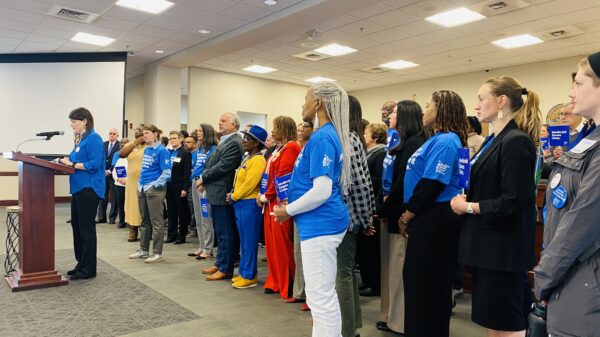By Chip Brownlee
Alabama Political Reporter
The Alabama Education Association has won a lawsuit alleging that the Retirement System of Alabama PEEHIP Board met illegally and improperly raised state employees’ health insurance rates.
A Montgomery County Judge, Johnny Hardwick, issued the ruling Sunday in favor of the AEA. In the 13-page order, Hardwick agreed with the AEA’s allegation that the meeting — which ended in an increase in premiums and surcharges on spouses’ rates — was held outside of the purview of the Alabama Open Meetings Act, ruling the rate changes invalid.
The ruling also held that the PEEHIP Board must now return held funds back to the members who paid those surcharges and rate increases, according to court documents. Meaning that retirees and state employees who paid into those rate increase may soon get a refund to their accounts.
The refund may not happen if PEEHIP appeals the ruling, which the agency said Monday in a statement that they would do.
“PEEHIP respectfully disagrees with the judge’s decision in this case. PEEHIP will appeal the decision to the Alabama Supreme Court and move to stay the court’s order,” the agency said in a statement.
Regardless, AEA is claiming the ruling as a victory.
“This is a great day for AEA and for all public education employees,” said AEA President Sherry Tucker.
The Chief Accountant and Financial Officer for the Retirement System of Alabama, Diane Scott, had previously stated that the escrowed funds were yet not being counted toward the system’s budget when asked by the Legislature about PEEHIP’s funding.
The board increased the premiums by $80 a month at a board meeting on April 27, 2016, as part of the surcharge on employees whose plans cover their spouses and any dependents. The premium increased doubled the average monthly premium for individuals from $15 to $30. The change also increased the average family premium — not including the spouse — by 590 percent from $30 a month to $207.
The board held two meetings that day — one which was ruled proper and one that was ruled improper.
The board issued a public notice that the board would hold a 1 p.m. meeting that day. During that meeting was when the rates were voted to be increased. But another meeting, which was held at 9:30 a.m. that day without any public notice, was ruled improper. PEEHIP staff gave a presentation about the needs for the increase during that meeting, which should have publicized, according to the judge.
PEEHIP lawyers argued that the case should have been dismissed because the meeting at 9:30 that day was an executive training session, which would not usually require public notice. Hardwick disagreed, rejecting the lawyers’ arguments.
The AEA has said they were told about that morning meeting, but didn’t have the appropriate time to prepare a counter-argument to the presentation and weren’t allowed to attend because of the strict attendance policy at training sessions.
“For many of our members, the PEEHIP Board’s actions completely took away the legislative pay raise that was so richly deserved,” AEA Executive Director Brenda Pike said in a statement, citing the Legislature’s decision last year to give education employees a 4-percent cost-of-living raise. “For everyone else, it took a large portion of it. We hope that the PEEHIP Board members will take this opportunity to reflect on their action and will take appropriate steps to ensure that the increases will not go into effect in accordance with the Judge’s order.”
Former AEA President Sheila Remington, the plaintiff who filed the lawsuit, also said the ruling was a victory.
“We are thankful that Judge Hardwick saw this situation for what it was – a violation of the Open Meetings Act to ram through a premium increase without public discussion or debate,” Remington said.
The Legislature last year approved PEEHIP’s $23 million funding increase request during the legislative session, which AEA representatives argued “fully funded” the agency and invalidated any need for a premium increase for enrollees.
“The fact that PEEHIP has functioned just fine without these funds should inform the board members that their action wasn’t the dire necessity their staff told them it was during the illegal closed meeting,” said Theron Stokes, the AEA’s associate executive director.























































